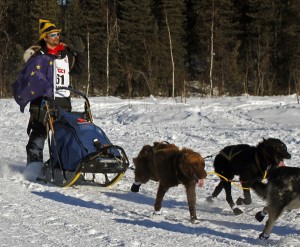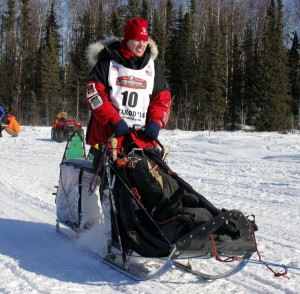Iditarod mushers are working hard to hold back teams on what has been an icy, hard packed trail. A snowless, rocky stretch of trail through a burn will slow them down, but most mushers are riding their brakes.

Hugh Neff dropped two dogs in Rainy Pass due to minor injuries, but he says it was likely a good choice.
“This type of trail, it’s probably safer to have 14 dogs instead of 16,” Neff said. “This trail is so lightning fast it’s ridiculous.”
Rookie Katherine Keith of Kotzebue agrees. She decided to leave a few dogs behind before she even left the start line in Anchorage.
“Primarily, because it’s a hard fast trail so I didn’t really need the additional pulling power and I didn’t want the extra pulling power being this is my first year and being this is a going to be a hard fast trail that’s going to be challenging,” Keith said.
Aliy Zirkle says she got a wakeup call after her sled tipped over as she was moving quickly down the trail.
“So I stopped and regrouped and I was like ‘You have to focus and drive your sled,’ which means you have to put a lot of effort into your legs your arms, your focus your brake and so I ran like that the rest of the way and that makes you tired and you have to rest,” Zirkle said.

Her husband Allen Moore came into Rainy Pass with ringing ears.
“It’s hard to hear right now just because of the sound of your brake and your drag,” he said.
Most mushers are trying to hold back their dogs this early in the race. But Hans Gatt says he tried to make up for a bib number that had him leaving the start line further back than he would have preferred.
“I pushed it a little bit in terms of cutting a little rest but I went very, very slow,” Gatt said.
But that may not help as teams head for Nikolai. According to the Iditarod, Martin Buser went through four sets of runner plastic, all demolished by bare rock exposed in the Farewell burn. At least one of his brake tines is also broken.




